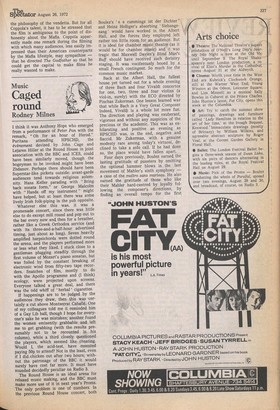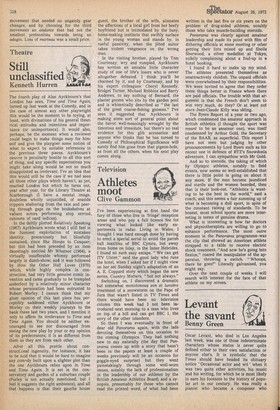Music
Caged round
Rodney Milnes
I think it was Anthony Hope who emerged from a performance of Peter Pan with the remark, "Oh for an hour of Herod." Puritans attending HPSCHD, the evenement devised by John Cage and Lejaren Hiller at the Round House in joint association with the BBC and ICES, could have been similarly moved, though the bogeyman to be invoked might have been Zhdanov. Perhaps there should have been Superstar-like pickets outside: avant-garde audiences tend towards religious solemnity. Hans Keller parading with "Bring back sonata form," or George Malcolm with "Hands off my instrument" might have helped, but at least there was some lively Irish folk-piping in the pub opposite.
Whatever else this was, it was a promenade concert, since there was little else to do except mill round and pop out to the bar every now and then for a breather, rather like a Greek Orthodox service (and with its three-and-a-half-hour advertised timing, just about as long). Seven heavily amplified harpsichords were dotted round the arena, and the players performed more or less what they liked. I stuck close to a gentleman plugging steadily through the first volume of Mozart's piano sonatas, but was foiled by the constant breaking of electronic wind from fifty-two tape recorders. Snatches of film, mostly to do with the Apollo programme and (I think) ecology, were projected upon screens. Everyone talked a great deal, and there was the odd whiff of ' herbal ' cigarettes.
If happenings are to be judged by the audiences they draw, then this was -certainly a cut above Montserrat Caballe. One of my colleagues told me it reminded him of a Gay Lib ball, though I hope for everyone's sake he was mistaken; another found the women eminently grabbable and left me to get grabbing (with the results presumably not to be recounted in his column), while a third closely questAoried the players, which seemed like cheating. Would I, the acid-test, have resented paying 50p to attend? Not in the least, even if I did chicken out after two hours; without the patronage of the BBC it would surely have cost far more. It must have sounded decidedly peculiar on Radio 3.
The Round House is an ideal arena for relaxed music making, and the BBC must make more use of it in next year's Proms. The only problem is one of numbers. In the previous Round House concert, both
Boulez's ' e e cummings ist der Dichter ' and Heinz Holliger's absorbing ' Siebangesang ' would have worked in the Albert Hall, and the forces they employed left rather too little room for an audience. But it is ideal for chamber music theatre (as it would be for chamber music) and it was tragic that Maxwell Davies's Blind Man's Buff should have received such derisory staging. It was vociferously booed by a small French contingent. So much for the common music market.
Back at the Albert Hall, the fullest house yet turned out for a whole evening of three Bach and four Vivaldi concertos for one, two, three and four violins (a viol-in, surely) with the ECO directed by Pinchas Zukerman. One lesson learned was that while Bach is a Very Great Composer Indeed, Vivaldi is a whole lot more fun. The direction and playing was exuberant, vigorous and without any suspicion of the precious or the academic. This was as exhilarating and positive an evening as HPSCHD was, in the end, negative and flaccid. Mr Zukerman, with a genuine modesty rare among today's virtuosi, declined to take a solo call. If he had done so, the place would have fallen apart.
Four days previously, Boulez earned the lasting gratitude of punsters by omitting the optional hammer blows in the last movement of Mahler's sixth symphony — a case of the maitre sans marteau. He also earned the gratitude of those who like their Mahler hard-centred by loyally following the composer's directions, by finding an overall tempo for the first movement that needed no ungainly gear changes, and by choosing for the third movement an andante that had not the smallest pretensions towards being an adagio. Loss of marteau was a small price.











































 Previous page
Previous page